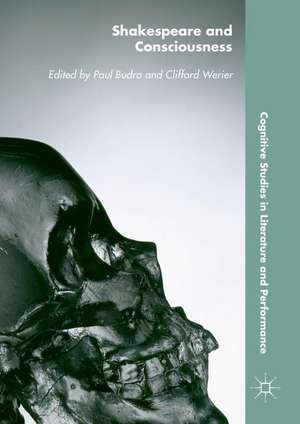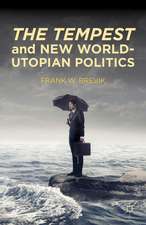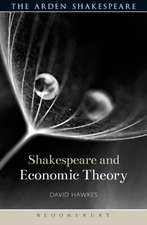Shakespeare and Consciousness: Cognitive Studies in Literature and Performance
Editat de Paul Budra, Clifford Werieren Limba Engleză Hardback – 20 apr 2016
| Toate formatele și edițiile | Preț | Express |
|---|---|---|
| Paperback (1) | 582.80 lei 6-8 săpt. | |
| Palgrave Macmillan US – 21 apr 2018 | 582.80 lei 6-8 săpt. | |
| Hardback (1) | 784.92 lei 6-8 săpt. | |
| Palgrave Macmillan US – 20 apr 2016 | 784.92 lei 6-8 săpt. |
Din seria Cognitive Studies in Literature and Performance
-
 Preț: 303.28 lei
Preț: 303.28 lei -
 Preț: 299.96 lei
Preț: 299.96 lei - 8%
 Preț: 537.27 lei
Preț: 537.27 lei -
 Preț: 302.20 lei
Preț: 302.20 lei -
 Preț: 299.34 lei
Preț: 299.34 lei -
 Preț: 301.10 lei
Preț: 301.10 lei -
 Preț: 381.98 lei
Preț: 381.98 lei -
 Preț: 392.37 lei
Preț: 392.37 lei -
 Preț: 386.81 lei
Preț: 386.81 lei - 15%
 Preț: 644.18 lei
Preț: 644.18 lei -
 Preț: 393.52 lei
Preț: 393.52 lei - 15%
 Preț: 640.88 lei
Preț: 640.88 lei -
 Preț: 384.86 lei
Preț: 384.86 lei - 15%
 Preț: 647.08 lei
Preț: 647.08 lei - 15%
 Preț: 698.62 lei
Preț: 698.62 lei - 18%
 Preț: 730.02 lei
Preț: 730.02 lei - 15%
 Preț: 586.88 lei
Preț: 586.88 lei - 15%
 Preț: 528.13 lei
Preț: 528.13 lei - 15%
 Preț: 584.43 lei
Preț: 584.43 lei - 15%
 Preț: 587.02 lei
Preț: 587.02 lei - 18%
 Preț: 725.26 lei
Preț: 725.26 lei - 18%
 Preț: 725.26 lei
Preț: 725.26 lei - 18%
 Preț: 730.97 lei
Preț: 730.97 lei - 15%
 Preț: 699.77 lei
Preț: 699.77 lei - 15%
 Preț: 640.88 lei
Preț: 640.88 lei
Preț: 784.92 lei
Preț vechi: 957.22 lei
-18% Nou
Puncte Express: 1177
Preț estimativ în valută:
150.21€ • 156.25$ • 124.01£
150.21€ • 156.25$ • 124.01£
Carte tipărită la comandă
Livrare economică 12-26 aprilie
Preluare comenzi: 021 569.72.76
Specificații
ISBN-13: 9781137596710
ISBN-10: 1137596716
Pagini: 307
Ilustrații: XIV, 307 p. 1 illus. in color.
Dimensiuni: 148 x 210 x 23 mm
Greutate: 0.53 kg
Ediția:1st ed. 2016
Editura: Palgrave Macmillan US
Colecția Palgrave Macmillan
Seria Cognitive Studies in Literature and Performance
Locul publicării:New York, United States
ISBN-10: 1137596716
Pagini: 307
Ilustrații: XIV, 307 p. 1 illus. in color.
Dimensiuni: 148 x 210 x 23 mm
Greutate: 0.53 kg
Ediția:1st ed. 2016
Editura: Palgrave Macmillan US
Colecția Palgrave Macmillan
Seria Cognitive Studies in Literature and Performance
Locul publicării:New York, United States
Cuprins
Introduction: Paul Budra and Clifford Werier.- I: Consciousness, Cognitive Science, and Character.- Consciousness and Cognition in Shakespeare and Beyond, Clifford Werier.- Shakespeare Studies and Consciousness, Edward Pechter.- Hamlet in the Bat Cave, Paul Budra.- II: Consciousness and Theatrical Practice.- King of Shadows: Early Modern Characters and Actors, Amy Cook.- The Distributed Consciousness of Shakespeare’s Theatre, Laurie Johnson.- Minds at work: writing, acting, watching, reading Hamlet, Ros King.- III: Consciousness and the Body.-
“Being Unseminared”: Pleasure, Instruction, and Playing the Queen in Anthony and Cleopatra, Andrew Brown.- Bodies and Selves: Autoscopy, Out-of-Body Experiences, Mind-Wandering and Early Modern Consciousness, Jan Purnis.- Hamlet and Time-Consciousness: A Neurophenomenological Reading, Matthew Kibbee.- IV: Consciousness, Emotion, and Memory.- Shylock’s Shy Conscience: Consciousness, Power and Conversion in The Merchant of Venice, Tiffany Hoffman.- Forgetting Cleopatra, Elizabeth Hodgson.- Notes on the Contributors.
“Being Unseminared”: Pleasure, Instruction, and Playing the Queen in Anthony and Cleopatra, Andrew Brown.- Bodies and Selves: Autoscopy, Out-of-Body Experiences, Mind-Wandering and Early Modern Consciousness, Jan Purnis.- Hamlet and Time-Consciousness: A Neurophenomenological Reading, Matthew Kibbee.- IV: Consciousness, Emotion, and Memory.- Shylock’s Shy Conscience: Consciousness, Power and Conversion in The Merchant of Venice, Tiffany Hoffman.- Forgetting Cleopatra, Elizabeth Hodgson.- Notes on the Contributors.
Recenzii
“Shakespeare and Consciousness, as the title suggests, explores issues pertaining to the works of William Shakespeare – his dramatic works, in this case – and consciousness, conceived in this study primarily through scientific theory. … this is definitely an interesting set of studies and there is much that can be drawn from it by those interested in applying theories of consciousness and cognitive science to literature, and those looking to embrace an alternative approach in considering Shakespeare’s plays.” (Charlotte Fiehn, The British Society for Literature and Science, bsls.ac.uk, November, 2017)
Notă biografică
Paul Budra is Professor of English at Simon Fraser University, Canada. He is the author of A Mirror for Magistrates and the de Casibus Tradition and co-editor of the essay collections: Part Two: Reflections on the Sequel, Soldier Talk: Oral Narratives of the Vietnam War, and From Text to Txting: New Media in the Classroom.
Clifford Werier is Professor of English at Mount Royal University, Canada. He is co-editor of Much Ado About Nothing for the Internet Shakespeare Editions and has written three writing textbooks for Nelson, Canada.
Clifford Werier is Professor of English at Mount Royal University, Canada. He is co-editor of Much Ado About Nothing for the Internet Shakespeare Editions and has written three writing textbooks for Nelson, Canada.
Textul de pe ultima copertă
This book examines how early modern and recently emerging theories of consciousness and cognitive science help us to re-imagine our engagements with Shakespeare in text and performance. Papers investigate the connections between states of mind, emotion, and sensation that constitute consciousness and the conditions of reception in our past and present encounters with Shakespeare’s works. Acknowledging previous work on inwardness, self, self-consciousness, embodied self, emotions, character, and the mind-body problem, contributors consider consciousness from multiple new perspectives—as a phenomenological process, a materially determined product, a neurologically mediated reaction, or an internally synthesized identity—approaching Shakespeare’s plays and associated cultural practices in surprising and innovative ways.











